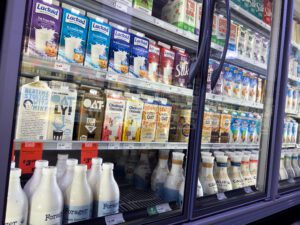Does Your Sports Drink Contain Excess Sugar and Artificial Ingredients?
June 9, 2024
 132
132 
Sports drinks have become very popular with athletes and fitness enthusiasts who consider diet and fitness as a whole for immediate hydration and a boost in performance. Unfortunately beneath their tantalizing colors and exciting flavors is a list of ingredients that could pose serious health risks.
Manufactures market these sports drinks as important for helping to replenish electrolytes and energy. They fail to mention or bring attention to their high sugar content, artificial additives, and excessive sodium.
These ingredients pose a serious risk for obesity and diabetes as well as dental health and kidney function.
Today, I am also going to reveal the 5 healthiest choices in sports drinks and hydration…first lets look at the health consquences of so much sugar in the sports drinks above.
Just when we thought we were doing something good for our bodies, we discover that the drink manufactures are not being truthful about the risks associated with the excess sugar that is put into these drinks:
Not only does consuming just one high sugar sports drinks have several potential health implications…just imagine if you consumer many of these drinks daily!
The consumption of sugar-sweetened beverages like sports drinks, has been extensively studied for its impact on weight gain and obesity.
According to PubMED and the National Insitutes for Health (NIH), Epidemiologic and Experimental Evidence shows a strong positive association between the intake of Sugar Sweetened Beverages and weight gain in both children and adults.
Low Satiety and Energy Compensation: Not only do they have high sugar content, but individuals also experience low satiety that induces cravings. In other words, individuals do not reduce their food intake sufficiently to offset the excess sugar calories that results in a positive energy balance and weight gain.
High Fructose Content: Fructose is metabolized in a much different way that is glucose that leads to increased fat storage and insulin resistance.
Consumption of sugar-sweetened beverages on a regular basis is associated leads to insulin resistance over time plus an increased risk of developing type 2 diabetes.
4. Cardiovascular Diseases
High sugar intake contributes to cardiovascular diseases. ie. increased blood pressure, inflammation, and other risk factors.
Leads to dental caries and ro an erosion of dental enamel. That is because citric acid in the various sports drinks is quite erosive.
5. Metabolic Disorders
Can lead to metabolic disorders like non-alcoholic fatty liver disease and metabolic syndrome.
During physical activity, the high sugar content can lead to gastrointestinal discomfort, including bloating and cramps. Take for example recently female tennis star Sabalenka who lost at the French open due to abdominal stress. This can be due to the rapid absorption and metabolism of glucose and fructose.
Incorporating healthy foods to eat like whole grains, lean meats, fruits, and vegetables into one’s diet might help people make better decisions by supplying necessary nutrients without the additional sugars that come in sports drinks.
Organic coconut water, organic cane sugar, electrolytes (sodium, potassium, calcium, magnesium), plant-based sweeteners, no artificial ingredients. ( contains 5 grams of sugar)
Here are the key differences between the 2 groups-ie not recommended and recommended
Higher Sugar Content: Powerade, Gatorade, Tailwind, and regular BodyArmor are not recommended
Low/No Sugar Content: NOOMA, Prime Hydration, Celsius, and BodyArmor Lyte have low or no sugar, plus they often use natural artificial sweeteners instead. (recommended)
We recommend healthier alternatives to get similar results without exposing yourself to excess sugar and artificial ingredients:
https://www.ncbi.nlm.nih.gov/pmc/articles/PMC3210834/
https://pubmed.ncbi.nlm.nih.gov/16895873/
https://www.cdc.gov/nutrition/data-statistics/sugar-sweetened-beverages-intake.html
https://www.powerade.com/products/powerade
https://www.gatorade.com/powders/gatorade-thirst-quencher/lemon-lime-powder-32-ounce-bag
https://www.liquid-iv.com/pages/ingredients
https://www.coca-cola.com/nz/en/brands/powerade
https://www.coca-cola.com/ca/en/brands/vitaminwater/vitaminwater-flavours
https://www.foodandhealth.com/blog/sport-drink-comparison-chart
https://www.truelemon.com/blogs/tc/vitamin-water
https://www.poison.org/articles/is-prime-an-energy-drink
https://www.vitaminshoppe.com/p/prime-hydration-blue-raspberry-12-drink-s/prh0001
Best Sports Drinks (2024): When Salty Sweaters Need to Rehydrate


In recent years, seed milks have gained popularity as a nutritious and eco-friendly alternative to dairy and other plant-based milks. Marketed as a healthy option, these beverages are often touted for their rich nutrient profiles and sustainability. However, a closer look reveals that not all seed milks are created equal. Many contain hidden ingredients and […]


NOTICE TO THE PUBLIC! A vast array of products seen in American grocery stores are notably absent on European shelves. This is not due to a lack of international trade but rather stringent food safety regulations in the European Union. Many popular American foods are banned in Europe due to concerns about health risks and […]


Did you know that there lurks an invisible ingredient in meat that has been raising health concerns —It is called meat glue- scientifically known as transglutaminase? Transglutaminase is an enzyme used to bind pieces of meat together to create larger, more uniform cuts that creates a seamless appearance. According to the American Meat Institute, it […]